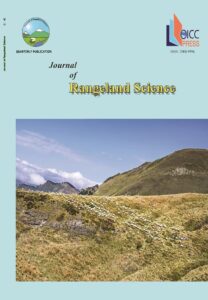Diet Selection by Sheep and Goats on Upland Rangelands (North Alborz) Case Study: Javaherdeh Rangeland of Ramsar
Authors
- Diana Askarizadeh 1, 2, 3, 4
- Gholam Ali Heshmati 5
Abstract
To reach the desirable ecosystem management, determining the animal diet
selection, which is one of the components of rangeland ecosystem, is important. Therefore, in
order to determine the grazing behavior and diet selection of sheep and goat, the upland
rangeland of northern part of Alborz was selected. In this study, the first weeks of July and
August of 2009 were chosen for the grazing period of the animals. Range value and range
trend method and the help of trend balance determined the range conditions and plant
compositions in these two periods. Using the bite counting method, the grazing behavior of
animals (sheep and goat) was observed from 0.5-2m via half an hour focus on each one and
completing hundred records. Data collected and analyzed through the analysis of variance.
Results showed that the bite counting method is a useful tool for determining the diet
selection of sheep and goat. The animals have selected different layers of vegetation cover;
therefore, range conditions have an effective role on the diet selection of animals within a
grazing period. It has also shown that consumption rate was different in daily grazing in
which sheep preferred to graze the forbs and goat browsed the bushy tree and shrub species if
the grazing conditions were normal without any tension. Knowledge of the conditions of
animals’ diet selection in each area could have an effective role on the production of
rehabilitation and development programs.


